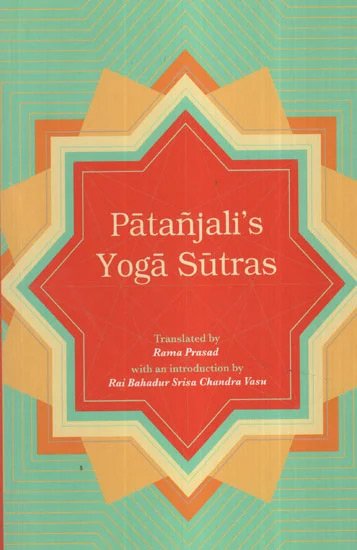Yoga-sutras (with Vyasa and Vachaspati Mishra)
by Rama Prasada | 1924 | 154,800 words | ISBN-10: 9381406863 | ISBN-13: 9789381406861
The Yoga-Sutra 3.21, English translation with Commentaries. The Yoga Sutras are an ancient collection of Sanskrit texts dating from 500 BCE dealing with Yoga and Meditation in four books. It deals with topics such as Samadhi (meditative absorption), Sadhana (Yoga practice), Vibhuti (powers or Siddhis), Kaivaly (isolation) and Moksha (liberation).
Sūtra 3.21
Sanskrit text, Unicode transliteration and English translation of Sūtra 3.21:
सोपक्रमं निरुपक्रमं च कर्म तत्संयमाद् अपरान्तज्ञानम् अरिष्टेभ्यो वा ॥ ३.२१ ॥
sopakramaṃ nirupakramaṃ ca karma tatsaṃyamād aparāntajñānam ariṣṭebhyo vā || 3.21 ||
sopakramam—fast in fruition, nirupakramam—slow, ca—and, or. karma—action, Karma, tat—over these. saṃyamāt—by Saṃyama. aparānta—of death, jñānam—the knowledge, ariṣṭebhyaḥ—by portents, vā—or.
21. Karma is either fast-in-fruition or slow; by Saṃyama over these comes knowledge of death; or, by portents.—127.
The Sankhya-pravachana commentary of Vyasa
[English translation of the 7th century commentary by Vyāsa called the Sāṅkhya-pravacana, Vyāsabhāṣya or Yogabhāṣya]
[Sanskrit text for commentary available]
The Karma which fructifies as life-period is two-fold, that which is fast-in-fruition and that which is slow-in-fruition. Thus, for example, a wet piece of cloth, well spread, dries in a short time. Similarly the fast-in-fruition.
The same cloth when gathered up, however, will take a long time to dry. Similar is the slow-in-fruition.
Further fire, thrown into dry hay and accompanied by wind in every direction, burns it in a short time; such is the fast-in-fruition. The same fire, however, applied to detached pieces of straw out of a heap, burns them in a very long time. Similarly the slow-in-fruition.
Thus the one-birth Karma which is responsible for the period of life is two-fold, the fast-in-fruition and the slow-in-fruition. By Saṃyama over these comes the knowledge of death, the smaller end of life.
‘Or, by the portents’:—A portent is three-fold:—Personal (ādhyātmika), elemental (ādhibhautika) and divine (ādhidaivika). Of these, the personal:—He hears not the sound in his own body on stopping the passage of the ears. He sees not the light in the eyes on pressing them.
And the elemental:—He sees the messengers of Yama. He sees suddenly and without thought the ancestors that have passed away.
Similarly the divine:—He sees the heavenly worlds and the Siddhas suddenly. Or, lie sees everything contrary to what he has been seeing the whole of his life.
It is by these that a Yogī may optionally know the proximity of death.
The Gloss of Vachaspati Mishra
[English translation of the 9th century Tattvavaiśāradī by Vācaspatimiśra]
‘Karma is either fast-in-fruition or slow; by Saṃyama over these comes the knowledge of death; or, by portents.’
The Karma which fructifies into life-time is two-fold, the fast-in-fruition and the slow-in-fruition. The one-birth Karma certainly which is the cause of life-time, life-state and life-experience, fructifies into life-period. The fast-fructifying Karma is that which is going on fructifying without any reference to what time it may take to finish by causing experience, of which more has been over and a little only remains, whoso operation is going on but whose fruitage is impossible to enjoy during life by one body and which, therefore, delays the Yogī, keeping him in the bondage of births.
The same when but a small portion of the fruit has been enjoyed and which is operating to produce the remaining fruit with reference to the time that has been taken by the enjoyment of the past, works but slowly and, now and then, is slow to fructify.
The Commentator renders this plain by two illustrations ‘As for example.’ He gives an illustration to render the same plainer still:—‘Or, as fire.’
The words ‘smaller end of life’ (aparānta) mean death with reference to the Great Latency which is the ultimate end. By Saṃyama over that Karma, that is, over virtue and vice, accrues the knowledge of death. By this the Yogī knows his fast-fructifying Karma, and then makes many bodies for himself and thereby enjoys the fruit thereof as fast as he likes and dies whenever he pleases.
He takes up the context:—‘Or by portents.’ The indications are three-fold. They are called portents (ariṣṭas), because they frighten like an enemy.
‘Or sees everything contrary, &c.’:—This excludes the trick of jugglers. But otherwise he begins to see heaven in villages and towns; he begins to see also that the world of men only is the world of gods.—21.
